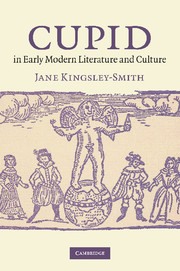Book contents
Introduction
Published online by Cambridge University Press: 10 November 2010
Summary
In John Donne's lyric poem ‘Loves Deitie’ the speaker expresses nostalgia for a time before Cupid:
I long to talke with some old lovers ghost,
Who dyed before the god of Love was borne;
I cannot thinke that hee, who then loved most,
Sunke so low, as to love one which did scorne.
Unrequited passion is attributed to an essentially sadistic deity. Yet it is the cultural reinvention of Cupid specific to early modern England that is ultimately to blame. Love's natural ‘Correspondencie’ (line 12) has been replaced by passion for one who scorns through the influence of Petrarchism, whilst his ‘Tyrannie’ has been enhanced by an expansion in divine power, perhaps attributable to Calvinism (line 19). The present book argues that Cupid did indeed extend his range of identities (and thence his facility for performing ‘cultural work’) in early modern England – ‘To rage, to lust, to write to, to commend, / All is the purlewe of the God of Love’ (lines 17–18) – but that what unites his disparate roles and makes Cupid a controversial, often seductive, figure for poets, dramatists and polemicists alike is his adversarial relationship to English Protestantism. Through this minor love-deity, matters of grave importance to the establishment of the ‘true’ faith were articulated and debated.
- Type
- Chapter
- Information
- Cupid in Early Modern Literature and Culture , pp. 1 - 23Publisher: Cambridge University PressPrint publication year: 2010



